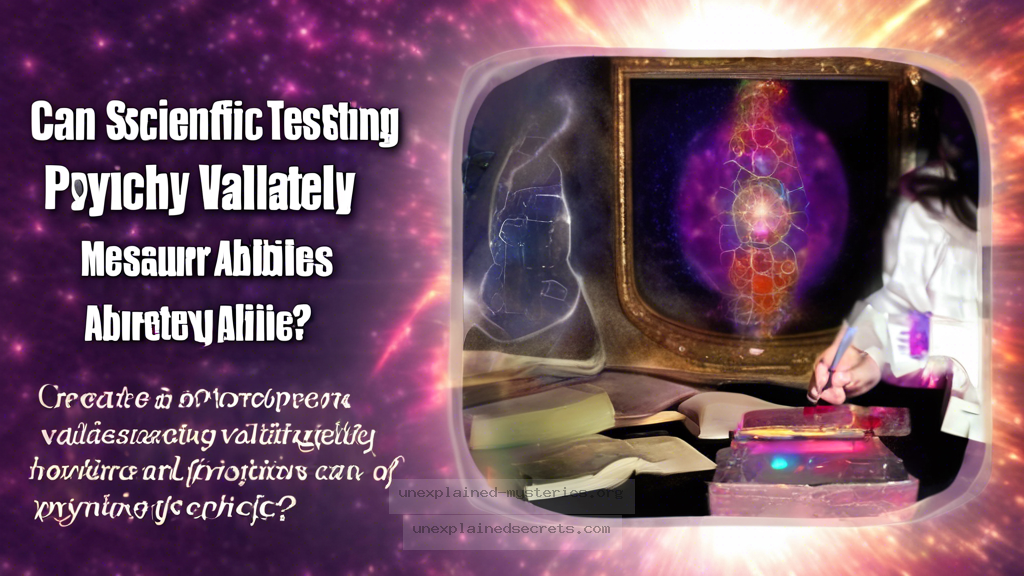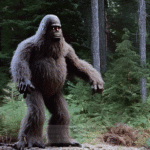Can Scientific Testing Validately Measure Psychic Abilities?
Can Scientific Testing Validately Measure Psychic Abilities?
The investigation of psychic abilities has captivated humanity for centuries, leading to an intriguing intersection of science, philosophy, and the unexplained. While many claim to possess these extraordinary skills—such as telepathy, clairvoyance, or precognition—the scientific community remains skeptical. Can scientific testing truly measure these elusive abilities? This question not only drives researchers to explore the boundaries of human potential but also invites a deeper understanding of consciousness and reality itself. In this blog post, we will examine documented cases, scientific approaches, historical context, and the implications of psychic phenomena, providing a comprehensive analysis of whether psychic abilities can be reliably measured through scientific methods.
Historical Context of Psychic Research
The study of psychic phenomena dates back to ancient civilizations, where oracles and seers often played pivotal roles in society. In the late 19th and early 20th centuries, the advent of spiritualism brought renewed interest in psychic abilities. The Society for Psychical Research (SPR), founded in 1882, aimed to investigate paranormal claims scientifically. Researchers such as William James and J.B. Rhine conducted experiments to explore the nature of extrasensory perception (ESP) and psychokinesis (PK). However, despite some intriguing findings, the scientific community largely dismissed these studies due to methodological flaws.
Core Concepts of Psychic Abilities
Psychic abilities can be broadly categorized into several types, including:
- Telepathy: The ability to communicate thoughts without using the known senses.
- Clairvoyance: Gaining information about an object or event without the use of the five senses.
- Precognition: The ability to perceive future events before they occur.
- Psychokinesis: The purported ability to move objects with the mind.
Despite these definitions, the fundamental question remains: Are these abilities real, or are they merely products of human imagination? This inquiry leads us to the heart of scientific testing.
Scientific Approaches to Measuring Psychic Abilities
To assess psychic abilities scientifically, researchers have employed various methodologies, including controlled experiments, double-blind studies, and statistical analyses. One of the most famous studies was conducted by J.B. Rhine at Duke University in the 1930s, where he used Zener cards to test telepathy. Participants were asked to identify symbols on cards hidden from their view. Rhine’s results indicated a success rate above chance, leading to claims of ESP. However, critics pointed out numerous flaws, including the lack of proper controls and potential sensory leakage.
Documented Cases: The Ganzfeld Experiments
The Ganzfeld experiments, conducted from the 1970s to the 2000s, represent a significant attempt to study telepathy under controlled conditions. In these experiments, one participant (the sender) attempted to transmit information to another participant (the receiver) in a sensory-reduced environment. Meta-analyses of these studies have shown a small but statistically significant effect indicating that receivers often scored better than chance. However, skeptics argue that the results could be attributed to methodological issues, such as inadequate randomization and the possibility of non-verbal cues.
Practical Implications of Psychic Research
The exploration of psychic abilities has far-reaching implications, not only for our understanding of consciousness but also for applications in fields such as psychology and medicine. For instance, some researchers propose that psychic phenomena could offer insights into non-verbal communication, intuition, and the nature of human consciousness itself. Additionally, anecdotal evidence suggests that certain therapeutic practices, such as energy healing, may have beneficial effects, which could warrant further investigation.
Alternative Perspectives: Skepticism in the Scientific Community
Despite the fascination surrounding psychic phenomena, the scientific community remains largely skeptical. Critics argue that many claimed psychic abilities can be explained through psychological principles, such as cognitive biases and the power of suggestion. For instance, confirmation bias may lead individuals to focus on successful predictions while ignoring failures. Furthermore, the placebo effect can produce real changes in perception and health, making it challenging to isolate psychic abilities. This skepticism serves as a reminder of the importance of maintaining rigorous standards in scientific inquiry.
Common Misconceptions about Psychic Abilities
Several misconceptions often cloud the discussion surrounding psychic phenomena:
- Myth: All psychics are frauds. While some individuals may exploit the belief in psychic abilities, many practitioners genuinely believe in their skills.
- Myth: Psychic abilities can be easily demonstrated. The unpredictability of psychic phenomena makes them challenging to replicate consistently.
- Myth: Science has proven psychic abilities don’t exist. While no definitive proof has been established, the lack of evidence does not conclusively disprove their existence.
Best Practices for Investigating Psychic Abilities
For those interested in investigating psychic phenomena, certain best practices can enhance the credibility of the research:
- Controlled Environment: Conduct experiments in a controlled setting to minimize external variables.
- Double-Blind Design: Ensure both participants and researchers are unaware of key elements to prevent bias.
- Statistical Analysis: Utilize robust statistical methods to analyze results and account for chance occurrences.
Future Developments and Ongoing Research
As technology advances, so too does the potential for investigating psychic abilities. Neurological imaging techniques such as fMRI and EEG could provide insights into brain activity during psychic experiences. Furthermore, interdisciplinary collaborations between scientists, psychologists, and parapsychologists may yield innovative approaches to understanding these phenomena. Ongoing research in consciousness studies may also contribute to unraveling the mysteries of psychic abilities.
Conclusion: The Uncertain Frontier of Psychic Research
The question of whether scientific testing can validly measure psychic abilities remains open-ended. While there have been intriguing findings and documented cases, the scientific community continues to approach these claims with skepticism. The historical context, core concepts, and practical implications of psychic phenomena highlight the complexities involved in this field of study. As research methodologies grow more sophisticated and technology advances, the exploration of psychic abilities may one day yield deeper insights into the nature of consciousness and human potential.
Other Articles
Recent Posts
- What Happened to Flight MH370? The Conspiracy Theories That Still Haunt Us
- What Secrets Lurk Within the Walls of the Infamous Trans-Allegheny Lunatic Asylum?
- What Evidence Supports the Existence of Bigfoot in the Pacific Northwest?
- What Happened to the Indus Valley Civilization? Unraveling the Mysteries of Ancient Urban Life
- Can Telepathy Be Scientifically Proven Through Laboratory Evidence?







